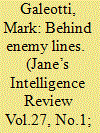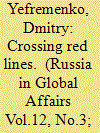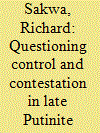|
|
|
Sort Order |
|
|
|
Items / Page
|
|
|
|
|
|
|
| Srl | Item |
| 1 |
ID:
136362


|
|
|
|
|
| Summary/Abstract |
Increased defence spending under Russian president Vladimir Putin has led to resurgence in the spetsnaz special forces. Mark Galeotti explains how these elite forces work and why they are at the forefront of Moscow’s new non-linear military doctrine
|
|
|
|
|
|
|
|
|
|
|
|
|
|
|
|
| 2 |
ID:
135407


|
|
|
|
|
| Summary/Abstract |
Putin has made it clear that the internet is a CIA project, and Russia’s most popular search engine a western plot.
|
|
|
|
|
|
|
|
|
|
|
|
|
|
|
|
| 3 |
ID:
136930


|
|
|
|
|
| Summary/Abstract |
Following the events that ensued after the December 2011 Russian parliamentary elections, the study of civic activity in Russia became highly topical. We can make two immediate observations on the nature and methodology of research on Russian civil society. First, the media and some academic critics tend to equate Russia's civil society with the liberal opposition to Putin's government. While liberal oppositional movements undeniably have a civic character and represent a significant part of Russia's civil society, much of Western analysis tends to appropriate this opposition's narrative for the purpose of narrating Russia's entire civic activism. Hence, these critics often focus on what they see as suitable, relevant, and reflective of the political and philosophical consensus prevalent in the West. As a result, those movements, personalities, and ideas that mirror core European political values receive wide analytical and media focus, while others that fall beyond the bounds of the existing liberal consensus are shelved, considered irrelevant or even plain erroneous. Yet, those ideas, which may appear at first glance to be at odds with the contemporary Western context, may prove upon close examination to be of the most immediate political significance for Russia.
|
|
|
|
|
|
|
|
|
|
|
|
|
|
|
|
| 4 |
ID:
134546


|
|
|
|
|
| Summary/Abstract |
The Ukrainian crisis is just ushering in a series of conflicts amid which a polycentric system of international relations will form. An effective multilateral mechanism must be created for preventing and settling crises in Europe and North Eurasia.
|
|
|
|
|
|
|
|
|
|
|
|
|
|
|
|
| 5 |
ID:
134555


|
|
|
|
|
| Summary/Abstract |
The current situation is a result of a prolonged process of careless and reckless attempts to involve Russia in the system of Western values. Meanwhile, analyzing Russian discourse solely from the standpoint of Western standards, which are regarded as universal, makes absolutely no sense.
|
|
|
|
|
|
|
|
|
|
|
|
|
|
|
|
| 6 |
ID:
134553


|
|
|
|
|
| Summary/Abstract |
As long as the fundamental restructuring of the global system is not reflected in people’s outlook (and this will take decades), the vacuum in the inner sanctum of Russian national consciousness will continue to be filled by the West.
|
|
|
|
|
|
|
|
|
|
|
|
|
|
|
|
| 7 |
ID:
136926


|
|
|
|
|
| Summary/Abstract |
In the mid-2000s, the decline of opposition politics in Russia was so sharp and undisputed that the title of an article I wrote at the time, ‘Political Opposition in Russia: A Dying Species?’ (Gel'man 2005) met with little objection. At that time, the impact of the opposition was peripheral at best. The ‘party of power’, United Russia (Edinaya Rossiya—UR), dominated both nationwide (Remington 2008) and sub-national (Ross 2011) legislatures, and the few representatives of the opposition exerted almost no influence on decision making. The share of votes for the opposition parties (in far from ‘free and fair’ elections) was rather limited (Gel'man 2008; Golosov 2011). Even against the background of the rise of social movements in Russia, anti-regime political protests were only able to gather a minority of 100 or so participants, while environmental or cultural protection activists deliberately avoided any connections with the political opposition, justly considering being labelled ‘opposition’ as an obstacle to achieving positive results (Gladarev & Lonkila 2013; Clement 2013). In other words, political opposition in Russia was driven into very narrow ‘niches’ (Greene 2007), if not into ghettos, and spectators were rather gloomy about the chances of its rebirth.
|
|
|
|
|
|
|
|
|
|
|
|
|
|
|
|
| 8 |
ID:
134593


|
|
|
|
|
| Summary/Abstract |
Elections for all 83 Russian governors were reinstated in Russia in 2012, seven years after they had been suspended. The democratic reform coincided with renewed political activism in Russia since December 2011, but the reform was as much a belated recognition of the shortcomings and failures from appointing Russian governors. Pragmatic necessity and not democratic conversion was the determining factor. Based on the first elections in October 2012, the reform will have only a limited effect over the next few years on democratic change in Russia, at most placating liberal and regional demands while consolidating personal rule under Putin.
|
|
|
|
|
|
|
|
|
|
|
|
|
|
|
|
| 9 |
ID:
136927


|
|
|
|
|
| Summary/Abstract |
The Putin system is based on control and the ‘manual’ management of political processes. In part this was a response to what was perceived to be the ‘anarcho-democracy’ of the 1990s, but it was also an attempt to find a way of dealing with more immediate challenges of societal and political management. The regime devised a whole series of strategies for dealing with opposition, ranging from cooptation to coercion. The ideological framework was a distinctive form of neo-Soviet depoliticisation based on an inclusive ‘centrism’. This model of political management was challenged during the 2011–2012 electoral cycle by a mass protest movement and a degree of intra-elite political contestation. This was accompanied by the radicalisation of a traditionalist counter-movement accompanied by a revanchist spirit at the heart of Putin's centrist coalition, which spawned a range of restrictive legislation in the Sixth Duma from 2012.
|
|
|
|
|
|
|
|
|
|
|
|
|
|
|
|
| 10 |
ID:
134547


|
|
|
|
|
| Summary/Abstract |
For the United States, at stake is its leader’s declining reputation and the risk of yet another humiliating defeat. The stakes are high also because Russia stands as a symbol of a rising and increasingly anti-Western “non-West.”
|
|
|
|
|
|
|
|
|
|
|
|
|
|
|
|
| 11 |
ID:
136477


|
|
|
|
|
| Summary/Abstract |
When Vladimir Putin annexed Crimea in March 2014, he challenged Ukraine’s sovereignty. In blatant defiance of Europe at large, Russia left her Western neighbors to question the true intentions of their oversized counterpart. Andrey Babitskiy, Russian journalist and war correspondent, compares the EU’s weaknesses to Russia’s strengths, yet argues that Europe’s shortcomings may well save the continent from the brink of collapse.
|
|
|
|
|
|
|
|
|
|
|
|
|
|
|
|
| 12 |
ID:
136925


|
|
|
|
|
| Summary/Abstract |
The wave of protests that shook the Russian capital and scores of Russian cities over the period 2011 to 2013 came as a great shock to the political establishment in the Kremlin. After decades of the passive acceptance of the status quo it appeared that civil society was at last wakening up. As Jensen notes, ‘after years of apathy, a new social force—the Russian middle class—seemed to be emerging, with a message that included not only a political, but also a moral and emotional rejection of the corrupt authoritarian state that developed during the Putin era’ (Jensen 2013, p. 1). However, by July 2013 the steam seemed to have run out of the protest movement. As Treisman notes, ‘Whether one uses police figures (almost certainly too low) or those of the opposition (probably too high), the number demonstrating in Moscow each month [fell] sharply—from 210,000 in December 2011 to 5,500 in July 2013 (according to opposition reports), or 57,500 to 2,000 (according to the authorities)’ (Treisman 2013, p. 256). This collection examines these momentous developments which shook the political establishment over the period 2011 to 2013 in the Kremlin and it charts the rise and decline of the non-systemic opposition in Russia at both the national and regional levels.
|
|
|
|
|
|
|
|
|
|
|
|
|
|
|
|
|
|
|
|
|